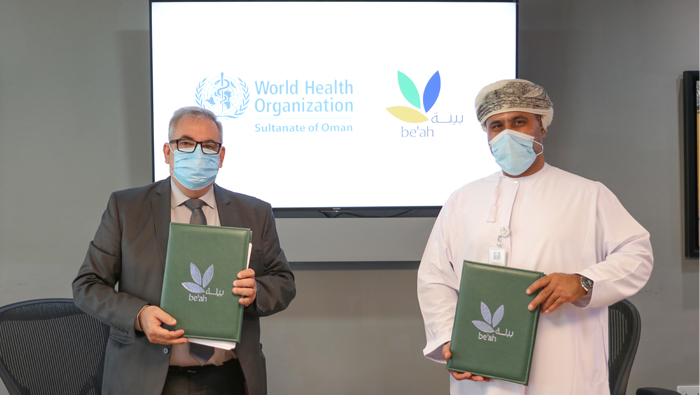
Muscat: With the aim to highlight the health risks of random throwing of used masks in public places that negatively affect human life and health, wild and marine life, the Oman Environmental Services Holding Company “be’ah” has launched an awareness campaign.
The drive has been launched in cooperation with the Ministry of Health and the World Health Organization office in the Sultanate.
Dr. Jan Jabbour, the Representative of the World Health Organization in the Sultanate, explained the importance of adhering to the preventive measures and procedures and following the instructions and guidelines established for protection from COVID-19. In this context, the organisation has developed a global and comprehensive guidance document on the use of masks and the best practices to dispose them in a safe manner.
Jassim Al-Wahaibi , Head of the Healthcare Waste Department at be’ah said, “There is an increasing concern about polluted single –use masks, which pose a threat to public health and negatively affect wild and marine life when disposed in the wrong way, and we are happy with this cooperation to tackle this global phenomenon, which could lead to the transmission of infection among the community.”
The Supreme Committee in charge of examining the mechanism for dealing with developments resulting from the spread of coronavirus (COVID 19) had previously issued decisions, obligating everyone to wear masks in public places and considers not wearing a mask a violation estimated at OMR100. This greatly increased the daily consumption of masks.
In addition , the United Nations Trade Authority “UNCTAD “ estimated global sales of masks at $166bn by the end of 2020, compared to about $800mn in 2019.
According to a report issued by “OceansAsia”, 1.56 billion masks ended up in the oceans resulting in between 4,680 and 6,240 metric tons of plastic.
Single – use contaminated masks contain many viruses, and cleaning workers are among the first victims who face the risk of infection, in addition to their environmental effects.
“Most- single- use masks are made of plastic materials such as polypropylene, polyethylene and vinyl- a material that takes up to 450 years to degrade – which makes it all the time a source of micro plastics and negatively affects wild and marine life and ecosystems, according to a report released by Oceans Asia.
be’ah has been cooperating with the Ministry of Health and a number of entities in the campaigns previously organised by the Municipalities.